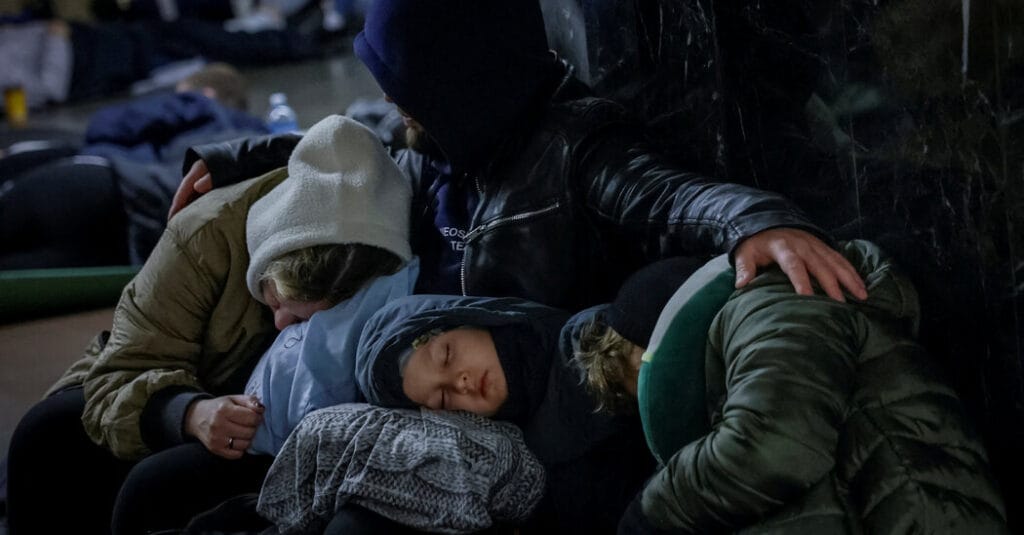At the start of the war, 22-year-old Sofia Tsarenko used to unwind with her friends over drinks in Ukraine. However, she soon realized that she couldn’t sleep without alcohol; her anxiety was overwhelming.
As the conflict continued, Tsarenko reported that her anxiety escalated, and she became more irritable. Eventually, even wine was no longer an effective coping mechanism. It was only after trying sleeping pills and antidepressants that she found some relief.
“It felt like angels were carrying me into sleep,” Tsarenko shared, living in the eastern city of Dnipro.
The full-scale invasion by Russia has resulted in countless deaths and injuries in Ukraine. Beyond the physical consequences, experts highlight significant mental health challenges that have arisen over three years of conflict. Sleep deprivation has escalated into a national health crisis, fueled primarily by near-nightly drone assaults.
Each night, Ukrainians across the nation find themselves awake, listening for the ominous sounds of Russian drones hovering above, followed by the inevitable explosions. Ukrainian officials note that drone strikes have intensified since U.S.- mediated peace discussions started, with an apparent increase in assaults on urban centers, heightening civilian anxiety and causing more sleepless nights.
Experts explain that chronic sleep deprivation significantly harms mental health, leading to anxiety, irritability, depression, and other more serious emotional issues, often referred to as “sleep debt.”
According to the World Health Organization, nearly half of Ukrainians have reported mental health challenges as of February. Additionally, sales of antidepressants skyrocketed by 46 percent last year in Ukraine, as per an analysis from Liki24.com, a leading drug distributor in the country.
It’s unclear how much of this rise is strictly due to sleep deprivation, given the numerous anxieties Ukrainians face regarding loved ones at the front or the uncertain conclusion of the war. However, experts agree that sleep loss exacerbates these conditions.
Dr. Davyd Shcherbyna, a psychiatrist and co-founder of a network of medical clinics in Kyiv, revealed that about half of his patients struggle with sleep issues, many of whom are also dealing with depression.
“When under stress, sleep is the first casualty,” he pointed out, noting that mothers often resist treatment out of fear that medication will prevent them from waking up for air-raid alarms, leaving their children unprotected in case of an attack.
The air-raid alerts themselves negatively impact mental health, disrupting normal sleep patterns, according to Sofiya Vlokh, a psychiatrist and researcher at Lviv National Medical University.
The World Health Organization had mentioned in February that almost half of Ukrainians reported mental health problems.
“Many people in Ukraine are suffering,” Vlokh stated, emphasizing that sleep deprivation is a serious concern not only because it can lead to severe mental health issues, but also because it can influence general well-being and productivity.
This resonates with Tetyana Horobchenko, 41, who lives near a frequently targeted airbase in Vasylkiv, close to Kyiv. During attacks, she and her husband take shelter in the bathroom with their pets, then struggle to fall back asleep. She finds herself scrolling through news on her phone instead.
“Some days, it seems like lack of sleep doesn’t bother me, but when I compare myself to the version of me who is well-rested, I see we’re different people,” she shared.
While drones are a prominent concern, other anxieties exist. In western Ukraine’s Lviv, Volodymyr Behlov, 38, expressed that worries about the future keep him up at night.
“It feels like I’ve lost hope for tomorrow,” stated Behlov, a cultural events manager, reflecting that his anxieties prompted him to seek antidepressants to aid his sleep.
Nonetheless, medication is not always effective or suitable for everybody. Hanna Lesiuk, 50, living on Kyiv’s outskirts, mentioned that while she takes antidepressants, she still feels physically unwell whenever she hears explosions.
Others are employing different strategies to seek safety or lull themselves to sleep. Some choose to sleep on floors or away from windows. In central Ukraine’s Vinnytsia region, Zoya Zhuk, 41, utilizes a weighted blanket. In western Ukraine, Maria Kysil, 33, keeps a medical kit with a tourniquet nearby.
In Kyiv, Valentyn Maidaniuk, 26, who works at an aviation university, shared that he tries to rationalize his feelings. “When I can’t sleep, I often consider how strong my building is,” he said.
Maryna Hrudiy, a 39-year-old psychological health consultant, made both a physical change and started a prescription for antidepressants. Previously, she would lie awake, fearing a strike might trap her 6-year-old daughter in another room. Now, she takes medication and shares her bed with her daughter.
Children also experience stress and sleeplessness. Oksana Khodak, 45, received a sedative prescription when her anxiety peaked and later discovered that her 14-year-old daughter, Yaroslava, was also struggling to sleep, showing symptoms of anxiety with trembling hands. Now, Yaroslava takes sleeping pills and anti-anxiety medication as well.
“I believed I was managing well with my daughter by having open conversations and hugging her during scary nights,” Khodak, from Zaporizhzhia, shared. Discovering the extent of her daughter’s psychological struggle “really broke my heart.”
For Olena Churanova, 37, exhaustion compelled her to seek psychiatric help. “I felt indifferent about the possibility of a drone hitting my home,” she revealed. Nevertheless, no medication can alter the harsh realities of war.
“Overall,” she reflected, “it frightens me that all of this has become our new normal: Air sirens, sleeping in the corridors, antidepressants.”
Nataliia Novosolova contributed reporting from Kyiv; and Yurii Shyvala from Lviv, Ukraine.


